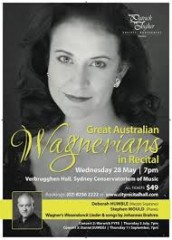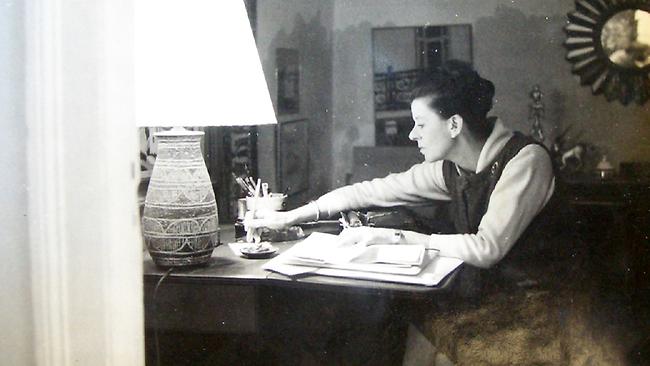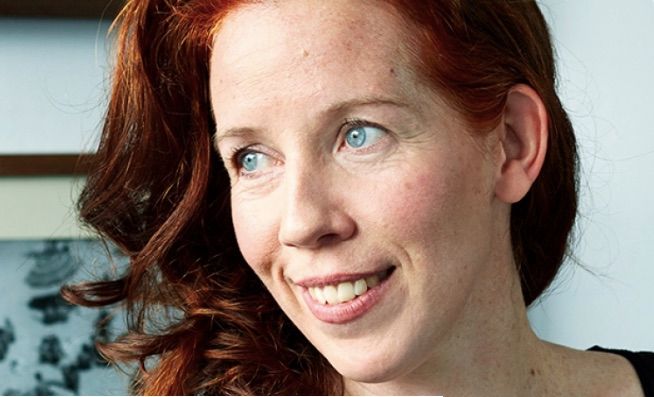Wagner, Mendelssohn and Handel – Deborah Humble’s Music Mix

Fresh from thrilling audiences with her portrayals of Erda and Waltraute in Neil Armfield’s production of The Ring by Wagner for Opera Australia in 2013, mezzo-soprano Deborah Humble is back in Australia for more Wagner and even more besides, with Mendelssohn and Handel on her schedule – none of it in the opera theatre.
Humble is in Australia for 5 weeks from her home in Hamburg where she has lived for the past 9 years. I caught up with her in the precincts of the Sydney Opera House last week, shortly before her departure to Hobart to sing Messiah at Hobart’s Federation Hall with the Tasmanian Symphony.
It was a brief breather for Humble who is preparing for a voice and piano recital of Wagner’s Wesendonck Lieder in Sydney at the end of May, which she will reprise in Melbourne in early June and with Orchestra Wellington in New Zealand. Before that, there are three performance of Mendelssohn’s Elijah with the Sydney Symphony Orchestra conducted by Paul McCreesh this week.
Humble’s recital of the Wesendonck Lieder is the first of series called Great Australian Wagnerians in Recital sparked after The Ring cycle in Melbourne. Says Humble, “Hopefully the idea is that more recital work will become available for professionals in Sydney and Melbourne, which I think would be a wonderful opportunity because there is not much in the way of lieder or recital in Australia.”
Those opportunities are determined by a mix of many factors, amongst them audience tastes and knowledge and suitable venues.
Humble understands that Art Song can be challenging for an audience. ” This is an all German recital. The first half is Brahms, the second half is Wagner. So we really have to explain what were singing and what were singing about because some of this repertoire is not so often heard here and not quite so well-known.”
Yet, there is affirmation that there is strong demand for the ‘right stuff’. Humble’s conviction is unshakeable as she explains “I don’t think it’s true to say that we can’t sell Wagner or we can’t sell anything that’s unusual or challenging. I think we can, if it’s done well. The Ring was very successful; it was a sell – out, just like the performances of Elektra in Sydney. What I believe it shows, is that Australians do want good quality opera. It gets people talking and it exposes Australian audiences to things they’ve not experienced before and that’s the important thing.”
She continues, in a perfectly modulated voice, citing distance as a significant factor in the depth and breadth of what is feasible to programme in Australia. “We’re so geographically isolated here, we don’t get a lot of exposure to someone who, for example, may be internationally renowned in a particular role in which they have specialised. But when people do hear these musicians it excites them and they want to hear more of that quality, to hear that repertoire again and they might be more inclined to buy tickets the next time something like that is done. It’s not important just for the ticket buying public but also for aspiring classical singers to hear what goes on elsewhere and I think it’s really important, even occasionally, whether it’s a conductor a singer or an instrumentalist, that we should be exposed to that talent as well as utilising our own.”
From Wagnerian opera to Wagnerian recital, Humble’s eyes light up as she says she has loved learning these songs. ” Wagner composed them in 1857 to poems by Mathilde Wesendonck, the wife of Wagner’s patron Otto Wesendonck . It’s said that they had a love affair and it was the first time ever that Wagner wrote music to some else’s words because he believed that his best music was reserved for his own words so he always wrote his own libretti. The fact that he broke with this practice tells about the importance of that relationship.”
“Two of the Wesendonck Lieder were written as ‘studies’ for Tristan and Isolde. This is exciting because Wagner’s music can be heard in the recital hall or the concert hall or the salon, so those who don’t like the thought of sitting through one of his lengthy operas, here’s a chance to hear some of that wonderful music. The five songs were written with piano accompaniment first of all and later orchestrated in several ways so there are 2 or 3 different versions. Wagner probably orchestrated the last one which is called Dreams (Träume ) because he wanted to play it under Mathilde’s window on her birthday. These songs make Wagner really accessible – they’re just 25 minutes long and a really nice way to present Wagner’s music without being full on.”
Travelling back in time, Humble admits to her passion for baroque music. “It is indeed at different place in the spectrum compared to Wagner” she observes, ” but they’re not so different to sing. In fact I sing quite a lot of Handel – even in the opera. Handel is important because it keeps the voice agile and that’s very important.” Humble’s baroque roles include Dido, Zenobia in Radamisto, Ino in Semele, Lichas in Hercules and solos in the major sacred works by JS Bach. Such is her love of the baroque that it was the topic of her master’s degree and it’s clear that she is looking forward to singing Messiah.
Fast forward to later this year and Deborah Humble has two more engagements in Hamburg as guest artiste with the Hamburg Staatsoper before Simone Young leaves next year. “We’re doing wonderful seldom performed dramatic oratorio by Honegger in October called Jeanne d’Arc au bûcher (Joan of Arc at the Stake) in concert. The great French actress Fanny Ardant will have the speaking the role. My final contract with Simone Young is performing as the First Maid in Elektra next February.” She pauses. ” I’m very lucky. I know exactly where I will be and what I will be doing for the next 15 months at least.”
Shamistha de Soysa for SoundsLikeSydney©
Click here for concert information on Great Australian Wagnerians in Recital.
Deborah Humble is mezzo-soprano soloist in the Sydney Symphony Orchestra’s production of Mendelssohn’s Elijah conducted by Paul McCreesh at the Sydney Opera House on May 14, 16 and 17.





